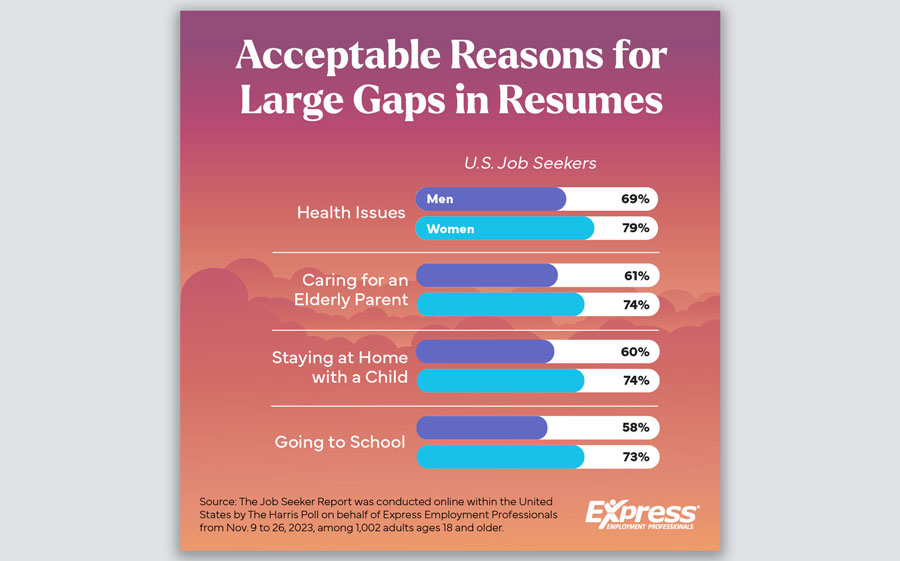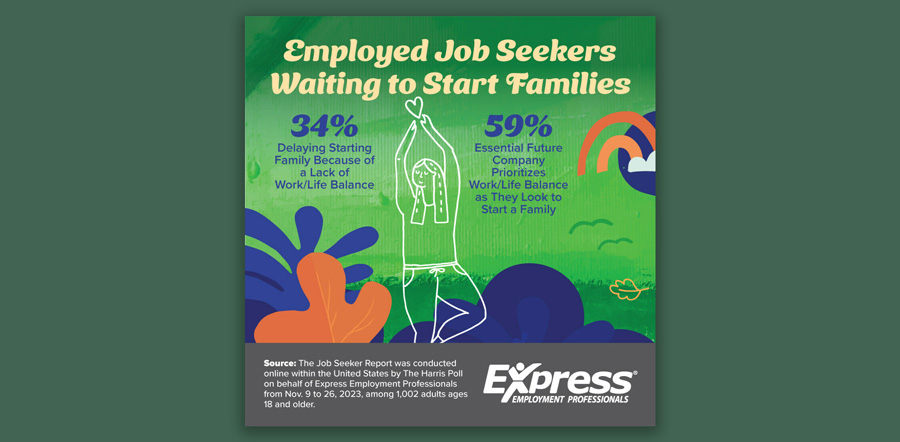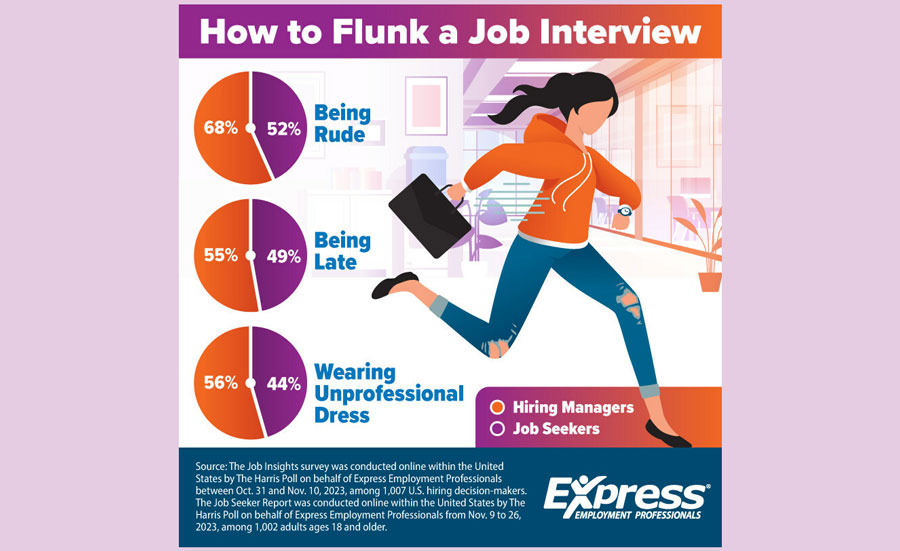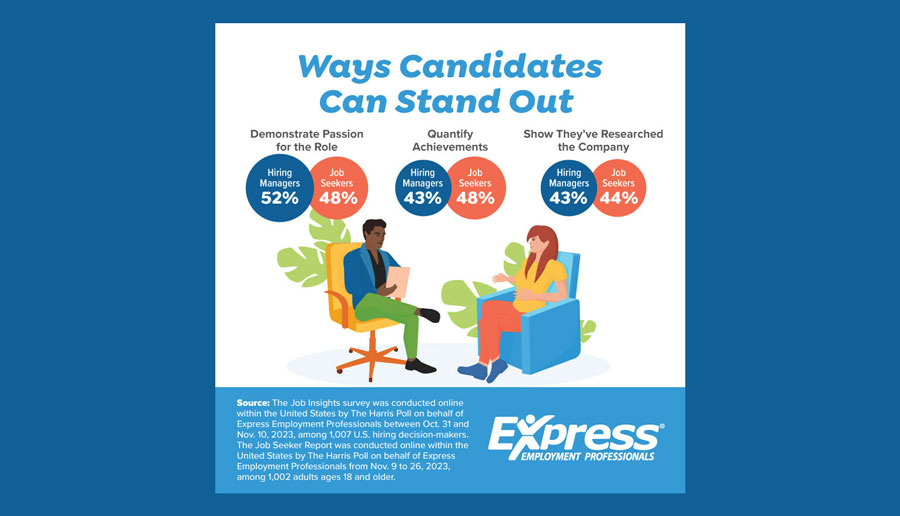41% of American Job Seekers Can’t Be Themselves at Work; 79% Fear Discussing Certain Topics
However, Employers Encourage Authenticity, Promoting Positive Mental Health
Latest Results from The Harris Poll
OKLAHOMA CITY — Although overall company culture has become more casual, 41% of U.S. job seekers still don’t feel comfortable being themselves in the workplace as 79% believe employees are discouraged from discussing certain topics.
This is according to a recent Express Employment Professionals-Harris Poll survey.
The top three topics still follow the “tried-and-true” philosophy of topics to avoid at work: salary/wages (51%), politics (50%) and religion (47%). Additionally, Gen Z perceives discussing politics (64%) as more frowned upon than discussing salary/wages.
While job seekers may feel there are subjects they shouldn’t talk about at work, that doesn’t mean that they are uncomfortable doing so.
Discussing family is a topic that 4 in 5 job seekers (80%) are fine with, proving even higher for Gen X (85%). More than half of job seekers are also okay with discussing physical health (69%), DEI&B (67%) and mental health (53%).
And, as for the traditional three topics to avoid at work, at least 2 in 5 are comfortable sharing salary/wages (53%), religion (48%) and politics (43%). Gen Z and Millennials are far more comfortable discussing salary and wages (70%, 58% vs. 45%, 40%) and religion (62%, 52% vs. 42%, 39%) compared to Gen X and boomers/seniors.
Workplace etiquette can be a moving target though, as more than half of job seekers (56%) feel it is confusing to know what is and isn’t acceptable etiquette in the workplace because it has changed so much. Perhaps for that reason, most job seekers (86%) say they like to keep their home life separate from their work life.
Encouraging Authenticity
Around three-quarters of hiring managers (76%) say their company places a great deal/moderate amount of priority on encouraging employees to be authentic (i.e., bring their whole selves) at work.
A key part of the whole self of an employee is their mental health — and three-quarters of hiring managers say their company also promotes positive employee mental health (77%). Yet digging deeper, only around 2 in 5 say their company places a great deal of priority on authenticity (39%) and promoting positive mental health (40%), perhaps leaving room for improvement in these areas.
An inability to discuss topics openly at work could hinder some employees from feeling welcome to share and add their unique perspectives at the company.
The majority of hiring managers (70%) say there are topics employees are discouraged from discussing at their company — including politics (38%), salary/wages (38%), religion (35%) and their health (both physical and mental) (24%). Diversity, equity, inclusion and belonging (12%) and family (12%) are also off the table at some companies.
“Several company environments now lean toward a more laid-back atmosphere in the post-pandemic era; however, some sensitive conversations are not appropriate for the workplace,” said Bill Stoller, Express Employment International CEO. “While people should be comfortable being themselves at work, employees should respect the beliefs of their colleagues, creating a safe space for everyone. A healthy company culture is an inclusive and supportive one, no matter the personal differences.”
Survey Methodology
The Job Insights survey was conducted online within the United States by The Harris Poll on behalf of Express Employment Professionals between Oct. 31 and Nov. 10, 2023, among 1,007 U.S. hiring decision-makers.
The Job Seeker Report was conducted online within the United States by The Harris Poll on behalf of Express Employment Professionals from Nov. 9 to 26, 2023, among 1,002 adults ages 18 and older.
For full survey methodologies, please contact Sheena.Hollander@ExpressPros.com, Director of Corporate Communications & PR.
If you would like to arrange for an interview to discuss this topic, please contact Sheena.Hollander@ExpressPros.com, Director of Corporate Communications & PR.

About Bill Stoller
William H. “Bill” Stoller is chairman and chief executive officer of Express Employment International. Founded in Oklahoma City, Oklahoma, the international staffing franchisor supports the Express Employment Professionals franchise and related brands. The Express franchise brand is an industry-leading, international staffing company with franchise locations in the U.S., Canada, South Africa, Australia and New Zealand.
About Express Employment Professionals
At Express Employment Professionals, we’re in the business of people. From job seekers to client companies, Express helps people thrive and businesses grow. Our international network of franchises offers localized staffing solutions to the communities they serve across the U.S., Canada, South Africa, Australia and New Zealand, employing 492,000 people globally in 2023 and more than 11 million since its inception. For more information, visit ExpressPros.com.










